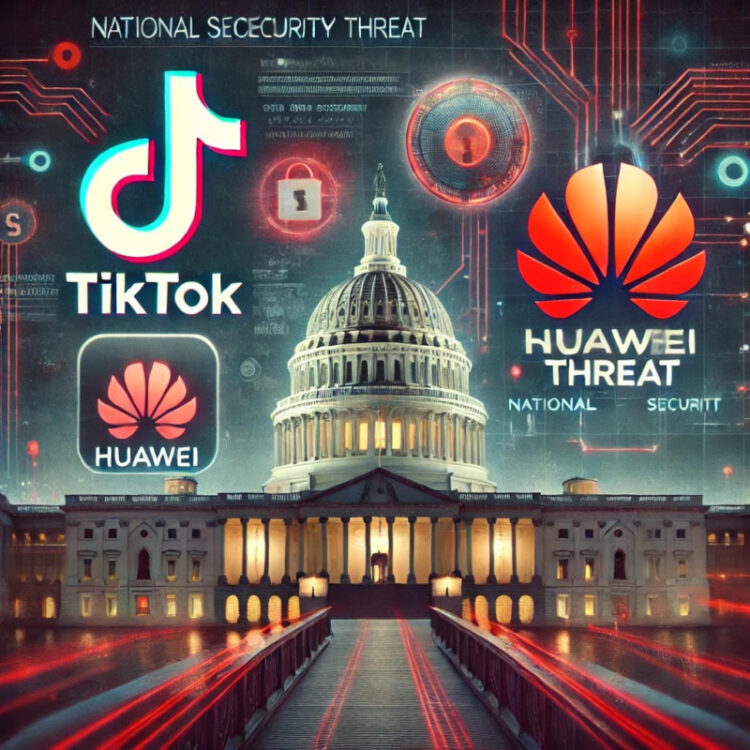Publisher: Maaal International Media Company
License: 465734
Huawei, TikTok and DeepSeek are in the crosshairs of US national security charges, data leaks and copyright theft
اقرأ المزيد
After Huawei and TikTok, DeepSeek, the new player, entered the competition, and the United States finds itself in an open confrontation with Chinese technology giants, as the story began with the ban on the Huawei application and the repeated threats against TikTok to the controversy surrounding DeepSeek these days.
The world has always looked to China as a factory for the world, as it built its economy on mass production and low-cost industry, but the leadership that China has achieved over the past decade in the technical field has become disturbing to Washington as a result of concerns about US national security, and accusing Beijing of hacking these companies.
The beginning of the chapters of the story was with Huawei when it became a real competitor to American telecommunications companies, which prompted Washington to ban the company in 2019, accusing the company of spying for Beijing and putting the company on the blacklist, and America prevented all Australian companies from cooperating with Huawei completely. While New Zealand, Japan, and Britain have partially banned (preventing the use of Huawei equipment within certain communication networks that contain sensitive information about users, or allow eavesdropping on communications).
The second chapter of the American-Chinese series was with TikTok, and if Washington’s war with Huawei is based on fifth-generation networks and digital infrastructure, its battle with TikTok is directly related to data control, and US President Joe Biden issued restrictions on the company and threatened a ban if the company in America is not separated from its parent branch in China, and America’s concerns about TikTok are related not only to data collection but also to its influence on American public opinion, especially among young people, accusing the company of political and cultural manipulation.
During his first presidential term, US President Donald Trump signed a ban on financial transactions for eight Chinese applications, and the banned applications include the famous online payment platform Alipay, in addition to QQ Wallet and the WeChat Pay platform, Tencent QQ, Kim Scanner, Share It, VMay, and WBS Office.
The latest chapters of the ongoing battle are the emergence of the Chinese DeepSeek application, which has caused a stir in the American digital world and the world in terms of its superiority over American companies with simple technologies and modest costs. The total losses of technology companies due to the impact of DeepSeek were estimated at about $1 trillion in the American market.
The main concerns about the sudden emergence of DeepSeek are that it operates according to an advanced artificial intelligence model with an operating cost much lower than the competing American models offered by Nvidia, which raises a bigger question about the feasibility of the billion-dollar investments offered by American companies, if there are models that operate at a lower cost according to the DeepSeek model, which was estimated to cost only $6 billion.
US President Donald Trump said a few days ago that China’s launch of the “DeepSeek” artificial intelligence technology should be a wake-up call for the artificial intelligence industry in the United States, stressing the need to enhance American capabilities in this field.
The US Navy announced a ban on the use of any technologies based on DeepSeek, indicating that China may use artificial intelligence for espionage and controlling the flow of information.
Howard Lutnick, Trump’s nominee for US Commerce Secretary, has accused DeepSeek of theft, saying the Chinese company was able to create a powerful AI model “on the cheap” by leveraging stolen US technology and advanced American semiconductors, and vowed to address that.
In turn, David Sachs, Trump’s AI and currency czar, accused DeepSeek of using OpenAI models to train its model, a process Sachs described as theft, according to a report published by TechCrunch.
For its part, the Financial Times reported that OpenAI found evidence that DeepSeek used OpenAI’s own models to train its open-source model. OpenAI said it found some evidence of so-called “knowledge distillation,” a technique used by developers to get better performance on smaller models by using the output of larger models, allowing them to achieve similar results on specific tasks at a much lower cost. With this tension, escalation, and trade and technology war between Washington and Beijing, what will the next confrontation look like? And what are the American options for dealing with China in light of the successive technological breakthroughs achieved by Beijing?
Related








